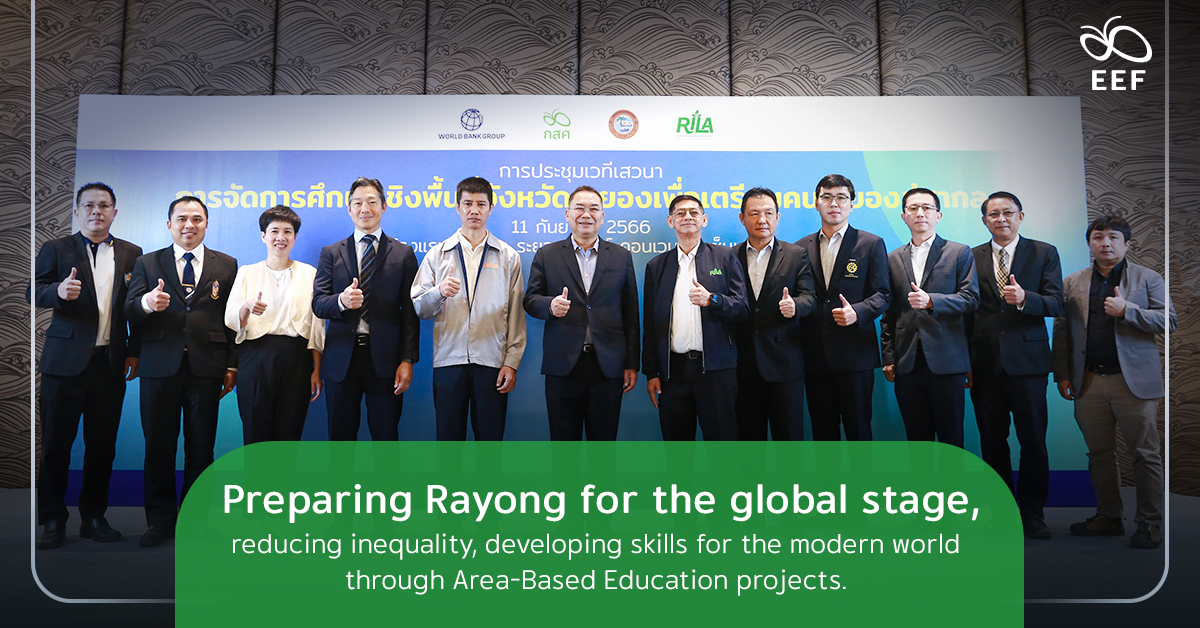
“Rayong is an economic province with Thailand’s highest Gross Provincial Product (GPP) per capita. This means Rayong is more advantageous than other provinces. The question is, how do we distribute the available opportunities to everyone?”

The information and question above served as a crucial trigger for sparking change and developing the working system in all sectors, leading to the adoption of a ‘scaled-down’ working approach at the provincial level, which has led to the mobilization of people from all over Rayong province to participate, exchange ideas, and collectively assess the foundational skills. This has resulted in the seminar ‘Preparing Rayong for the Global Stage’ and the creation of Area-Based Education projects to reduce inequality in Rayong, led by the Rayong Inclusive Learning Academy (RILA). By exploring foundational skills, the aim was to pave the way for the development of Rayong’s people into global citizens who are self-reliant and prepared for life in the modern world with global work skills.

It was the ‘first step’ of provincial-level collaboration to support data synthesis, design strategies to promote learning, and elevate proposals for Area-Based Education (ABE) policies in Rayong.
Given Rayong’s prominence in industrial estate areas, educational management must be linked with business. The manufacturing sector needs to understand the qualifications and skills required by companies. Especially as technological advancements indicate a decreasing need for labor-intensive work; instead, working with modern machinery requires individuals with a combination of skills, understanding, and expertise.

Anan Nakniyom, the Provincial Governor of Rayong, stated, “One of the approaches that the Federation of Thai Industries, Rayong Province, has planned is to collaborate with educational institutes to organize dual education programs. This allows students to learn at the institutes while simultaneously undergoing company internships. Therefore, upon graduation, the institutes will have already produced skilled workforces, effectively bridging the gap of producing graduates who do not meet job requirements.”
Additionally, developing and promoting foundational skills for the modern working era means the ability of literacy skills, digital skills, and socioemotional skills are like tools or foundational skills for accessing opportunities and coping with various risks due to changes. This is because having only specific professional skills might not be sufficient for the future world.

Koji Miyamoto, a senior economist specializing in Global Practice at the World Bank, emphasized that “Foundational skills in the new era are more important than specialized professional skills. Today, we see that the intrusion of digital technology may render some professional skills obsolete. However, humans continue to advance their knowledge and can synthesize information to enhance their capabilities. In that case, they can become desirable in the labor market and be ready to push themselves toward higher-paying jobs. Similarly, for the business sector, this means increasing productivity and innovation. These global citizens can rely on themselves in every way of changes.”
One of the challenges in this project that needs to be discovered in Area-Based Education is what children and youth should be promoted and pushed towards to have the capabilities suitable for living and working in the area. Rayong, a tourist and industrial province, requires its people to be prepared for the international stage, starting with a language focus. Currently, Rayong has Provincial Administrative Organization schools that have been transformed into language centers, especially for English, Chinese, and Japanese, as well as other optional languages for children to choose according to their interests.

“Another equally important issue is ensuring that children and youth can go as far as possible in the education system. Schools must act as service centers ready to open doors to all children. Teachers must have information about each child in every aspect to know the families, understand the problems thoroughly, and then create an individual support plan for each child. Then, the school must be ready to relax certain rules that conflict with every child’s educational opportunities and self-development,” Mr. Piya Pitutecha, the Chief Executive of Rayong Provincial Administrative Organization and the Chairman of the RILA stated.

Therefore, it requires the collective effort of all stakeholders because when it comes to managing education, it certainly encompasses more than just the formal school system but also involves developing everyone in various forms, said Mr Somsak Paniengtong, the Committee of Educational Sandbox in Rayong Province. Thus, promoting an economic drive through people’s development requires spaces for the working-age population to enhance their skills for higher compensation. Accessibility to opportunities is possible only when all parties have the same goal, from policymakers, decision-makers, system administrators, educators, and private companies hiring the people.

For this reason, this forum has become a crucial step in bringing together people from all sectors to collectively explore foundational skills, determine development directions, and reduce inequalities. It aims to ignite belief among every sector that the people of Rayong can utilize education to shape and direct the city’s growth with everyone’s power and to prepare Rayong’s citizens to advance towards international standards, developing work skills to meet the demands of the modern world job market.
Credit: Rawis Larha | Content and Writer Production Officer

